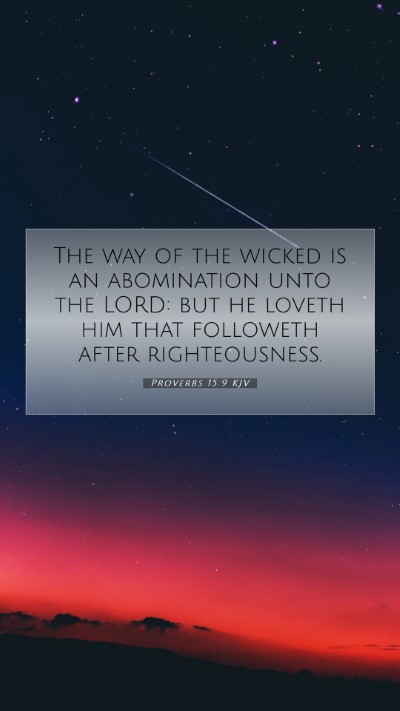Understanding Proverbs 15:9
Proverbs 15:9 states: "The way of the wicked is an abomination unto the Lord: but he loveth him that followeth after righteousness." This verse encapsulates a profound moral truth about divine approval and human conduct.
Bible Verse Explanation
The verse contrasts the lives of the wicked and the righteous, illustrating how their paths diverge in the eyes of God. Public domain commentaries offer valuable insights into this verse, providing a comprehensive understanding that connects to key themes in biblical literature.
Key Themes Identified in Proverbs 15:9
- The Nature of the Wicked: Matthew Henry notes that the wicked—those who act in opposition to God's commandments—travel a path that is utterly detestable to God.
- God’s Dismay at Sin: Albert Barnes emphasizes that the actions of the wicked provoke a strong reaction from God, indicating the serious consequences of living outside of moral law.
- The Value of Righteousness: Adam Clarke elaborates on the contrasting path of the righteous, who earn divine favor by living according to God’s will and embracing moral uprightness.
Scriptural Analysis
This verse invites deeper inquiry into the nature of divine justice and human response. Each commentary highlights different aspects that enhance our biblical exegesis.
1. Moral Order and Divine Judgment
The idea that the wicked's way is an "abomination" signifies a profound moral order established by God. As noted by Henry, this not only stresses God’s disapproval of sinful behavior but also His aversion to sin itself. The principle that God loathes wickedness signifies a longing for righteousness.
2. Divine Love for Righteousness
In contrast, Clarke points out that God expresses His affection towards those who pursue righteousness. This reflects the biblical theme that adherence to God's commandments leads to fulfillment and divine favor.
3. Community and Individual Responsibility
The verse also highlights corporate and individual responsibilities in pursuing righteousness. Barnes suggests that righteousness is not merely individualistic; it encompasses communal worship and ethical responsibility, serving as a guide to societal conduct.
Application of the Verse
Proverbs 15:9 can be practically applied in various aspects of life:
- Personal Conduct: Individuals are encouraged to self-reflect on their actions and align them with God’s standards.
- Community Standards: Encouragement to uphold community values that reflect righteousness can foster a more righteous society.
- Moral Decision-Making: When faced with choices, this verse serves as a guiding principle to reflect on the righteousness of one's decisions.
Cross References
Proverbs 15:9 can be related to the following verses:
- Psalm 1:6: "For the Lord knows the way of the righteous, but the way of the ungodly shall perish."
- Isaiah 5:20: "Woe unto them that call evil good, and good evil."
- Romans 6:23: "For the wages of sin is death; but the gift of God is eternal life through Jesus Christ our Lord."
In-Depth Bible Verse Analysis
Engaging with this verse requires an understanding of its historical context and how it fits into the broader narrative of Scripture. Proverbs holds immense wisdom regarding practical living, providing timeless principles that resonate with readers today.
Conclusion
Proverbs 15:9 serves as a powerful reminder of the importance of choosing a righteous path in accordance with God’s desires. Through a careful examination of public domain commentaries, we gain valuable insights that enhance our bible study insights and enrich our journey in understanding Scripture.


